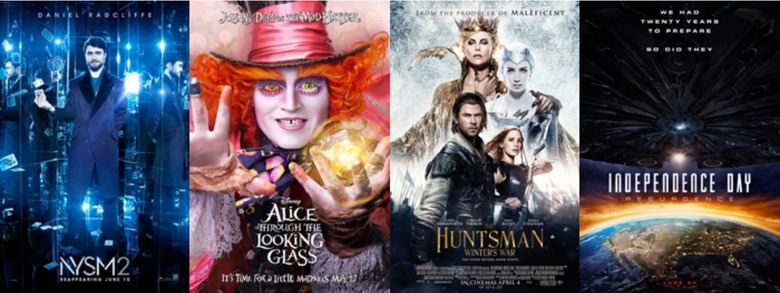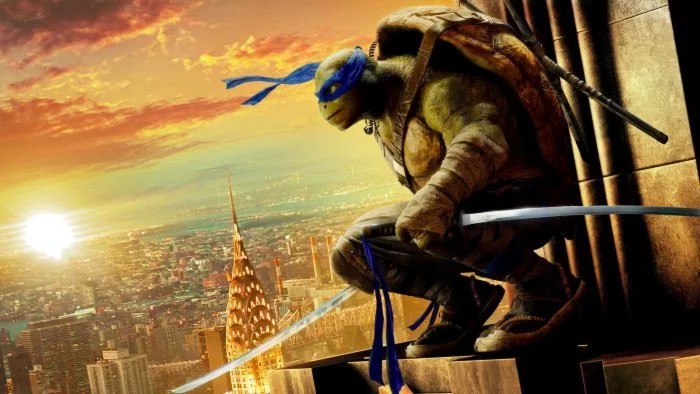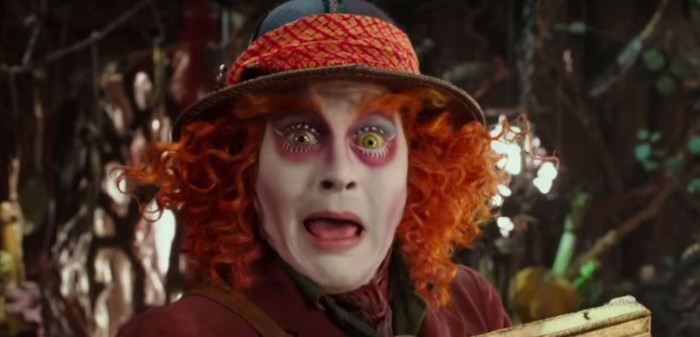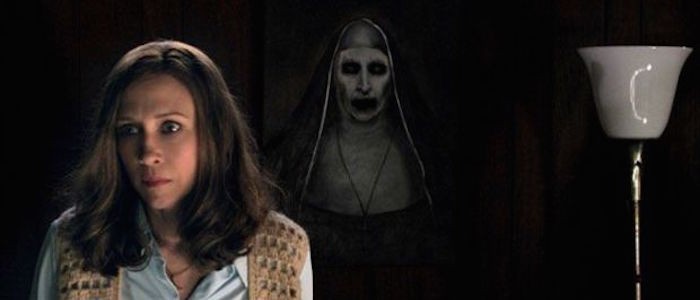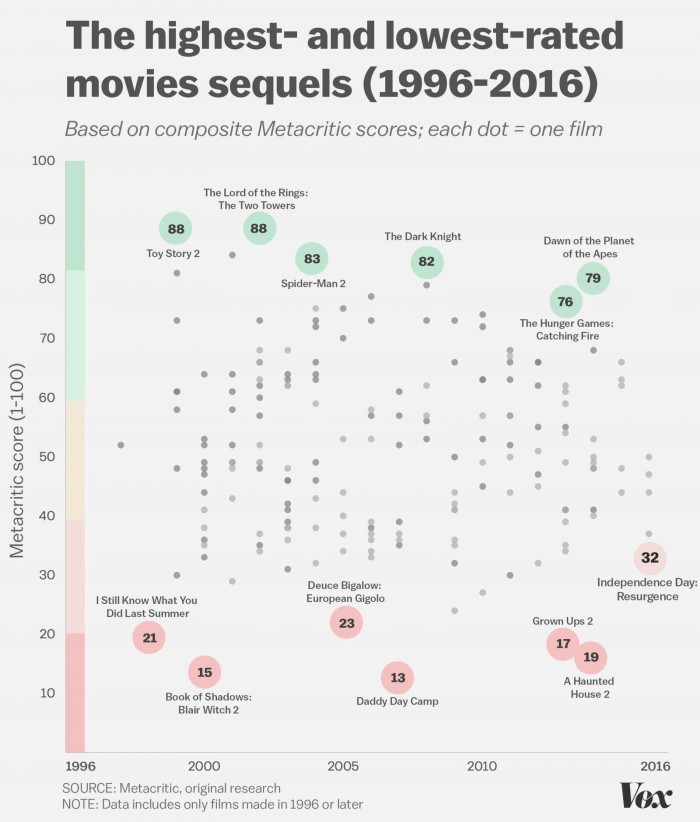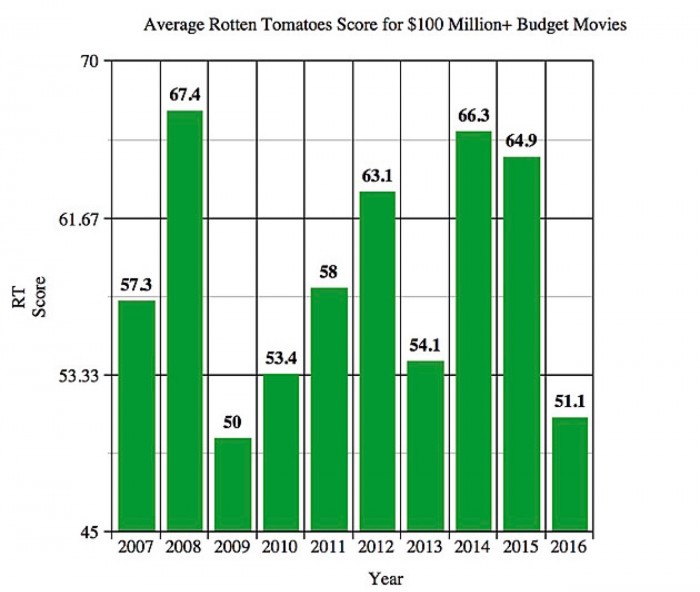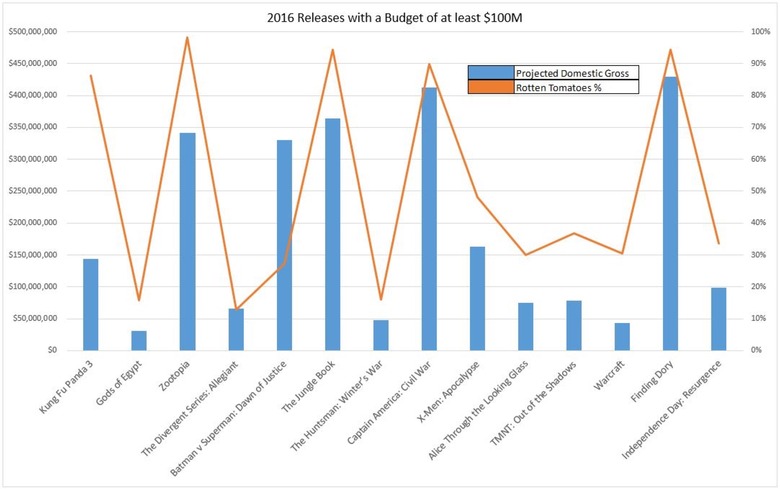The Reasons Why Sequels Are Failing To Find Audiences This Summer
One of the big stories of this summer is what Hollywood is calling "the sequel slump." The average sequel makes more than eight times the average original release, which explains why we have more of them than ever before. But the sequels of summer 2016 are failing to find audiences. Why aren't movie theatergoers flocking to sequels as they have in the past? Let's examine the possible reasons.
These Are Sequels No One Asked For or Wanted
It used to be that a movie had to have a fanbase to earn a sequel, but nowadays almost any movie that makes money at the box office can get one. Now You See Me, Snow White and The Huntsman and Alice in Wonderland are all movies that did very well theatrically, but were audiences craving sequels to these films? Summer 2016 is filled with sequels that no one asked for. Even films like Independence Day: Resurgence seem unexpected. Don't get me wrong, 20 years ago I think people would have wanted a sequel, but today it feels like too late and unnecessary.
On the other side of this coin, one of this year's better sequels, Finding Dory, could have also fallen into this category. But it has done quite well at the box office (it will beat Captain America: Civil War) and is well liked critically. While a Finding Nemo sequel was probably unexpected and unnecessary, the Pixar brand still holds weight for families and film geeks. And it probably helps that the film ended up being pretty good.
Are We Finally Suffering From Sequel Fatigue?
37 sequels will hit theaters this year, which is a record-setting figure that is more than double the number of sequels released a decade ago. Is it possible that there are too many sequels in this marketplace and people are hungry for more original stories? I wish this were the case but I'm too cynical to believe this to be true. The fact of the matter is that moviegoers are going to see a certain amount of movies this summer and they might flock to the big films that interest them, like Captain America: Civil War or Batman v Superman: Dawn of Justice. But adding more sequels to the release slate does not seem to result in additional ticket purchases.
People Don't Care About These Characters
What if most people see a sequel because of character, not the story? Why do you want to see Captain America: Civil War? Is it because you care about this divide between the superhero teams or is it that you're just really excited to see Robert Downey Jr. as Iron Man take on Chris Evans as Captain America? When it comes to sequels, people aren't attracted by brands or story, its the characters silly! This is a theory /Film managing editor Angie Han floated to me, and I think there is something to it.
People may have enjoyed Now You See Me but they had very little connection to the characters in that plot and twist-driven film? How about Alice in Wonderland? Did people see that to experience Tim Burton's crazy adaptation at a time when 3D was exciting and new? Or did they really fall in love with Johnny Depp's scary-looking Mad Hatter? Or how about Snow White and The Huntsman? I think you know the answer.
Why did Finding Dory sell so many more tickets than Alice Through The Looking Glass? The characters. People love the characters from Finding Nemo and wanted to go on another adventure with them.
Are the Summer 2016 Sequels More About Brand Extension Than Storytelling?
This one comes from Mark Harris of Vulture who admits that while sequels "have always been a financially driven proposition," for the 15 years or so "the bottom-line pragmatism behind sequels did not erase another priority: narrative."
Is there more left to tell? Can audiences be lured back with the promise that a story they thought was complete was merely a first chapter? Sometimes that could take filmmakers quite a while to figure out. Aliens did not appear until seven years after Alien; Terminator 2: Judgment Day arrived seven years after The Terminator. Neither movie was a mere reprise of the original or anything like it, which is one reason why each is now regarded as a genre classic in its own right. This summer's sequels are not, for the most part, story continuations but brand extensions. Some are good and some not; some have succeeded and some have flopped, but almost all of them are different beasts than the first generation of blockbuster genre sequels. ... Summer should be a season of big swings — blockbusters that aren't all presold, big filmmakers wielding big ambitions and, when necessary, big budgets to take you places and show you things you've never seen before. That means betting on new ideas — you know, those things without which sequels couldn't be generated; otherwise, summer will just feel like rerun season, but with marginally more billboards. ... These movies are not big swings. They are, for the most part, big, expensive bunts. And bunts will never be why people love the game.
And with the creation of cinematic universes, it seems all the more apparent. I feel like even general audiences are seeing between the lines and can see that some of these films are the result of a committee in a board room and not a passion to tell a continuation of this story.
2016's Sequels Have Mostly Been Big Disappointments
One thing to notice about the sequels released this year is that as a whole they have been worse then any year in recent memory. The image above comes thanks to Vox who graphed out the Metacritic scores of all the sequels over the last twenty years. As you can see, critics have disliked this year's sequels more than any year in the past two decades.
You can't always relate public opinion to box office, because big-budget tentpoles tend to be more critic-proof. This explains why each Transformers sequel continues to make huge cash at the box office despite getting worse and worse critical and audience reactions. It is possible that word of mouth and social media are having a much bigger effect on bad cinema than in year's past.
But its not just that 2016's sequels have been a disappointment this summer. Matt Singer at ScreenCrush crunched the numbers and found that this summer so far has the second lowest average Rotten Tomatoes score of the past decade for big budget movies.
Hope Is Not Lost
But all hope isn't lost. A friend of mine tweeted out the above image, showing the relation of box office to Rotten Tomatoes scores for films released this year with a budget of over $100 million. As you can see, for the most part, this seems to prove that, as Cat Hicks puts it, audiences crave and respond to good stories.

